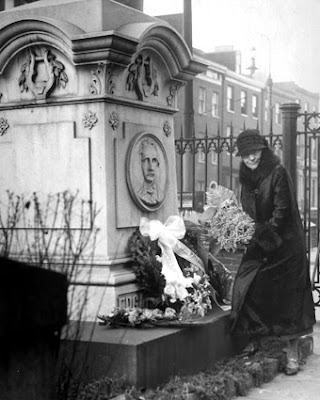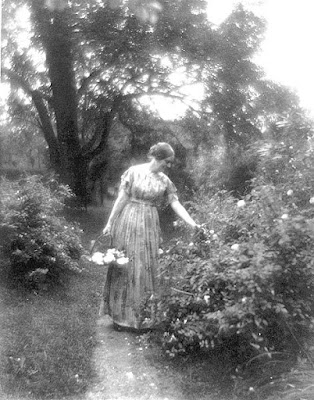WESTMINSTER CHURCHYARD
(Edgar Allan Poe)
by
LIZETTE WOODWORTH REESE
Stone calls to stone, and roof to roof;
Dust unto dust;
Lo, in the midst, starry, aloof
Like white of April blown by last years stalks
Across the gust
A Presence walks.
It is the Shape of Song;
About it throng,
Great Others, and the first is Tears;
The ended years;
And every old and every lonely thing;
Old thirsts that to old hungers cry;
The poignancies of earth and sky;
The little sobbing of the spring.
He heeds them not;
They are forgot;
For him, behind this ancient wall,
The Best of all
The short day sped;
A roof; a bed;
No years;
No tears.
Not his the strain
Of hill or lane;
Of orchards with their humble country musk,
And bent old trees,
And companies of small black bees;
Of gardens at the dusk,
Where down the hush,
A thrush
His heartbreak spills;
Of daffodils
By farmhouse doors a windy sight,
A yellow gust driven down the light.
Nor his the note
That trumpeted of war,
Of ancient creed;
Strange, innocent, remote
His reed
A wind along the hollows of an echoing shore:
Each day was but a pool within the grass,
A haunted space,
Where saw he as in glass,
But Wonder, with her dim, drowned face.
For Wonder was his kin,
His very twin;
Blood of his blood indeed,
And steadfast to his need;
The ecstasies of cloud and sky;
The cry out in the dark;
The half lit spark
That lures from earth to star;
The fleeting footsteps far and far;
The trailing skirts so nigh, so nigh,
These drew he from their ghostly mesh
And made them flesh;
We reach dull hands, for we would know;
They fade; they go;
Yea, he and they together,
Into another weather.
A strange, autumnal verse;
Where griefs their griefs rehearse;
A flaw of rain within the air;
Black pools; the bough gone bare;
And red dead leaves and broken wall;
The flare of tempest driven behind them all.
Yet ever is his music such,
So rapt of touch,
It mellows all the ache,
And the heartbreak;
We cannot weep, but we stand wistful-eyed,
Like children at the eventide,
In some fast darkening spot,
Who hear their mother call, but see her not.
Oh, truest singer east or west!
Not for the poor handful of hire,
But for the fury of the song,
The unescapable desire,
He sang his short life out, and it was best;
His wage was hunger; it was long
Betwixt the days of blame and jeers,
And that which set him with his peers;
A fragmentary song, yet dear to Art;
Its numbers hold
Enough of music for new world and old,
To shake them to the heart.
And now, many a summer s weather,
Now, many a winter s storms together,
The wind; the shower;
The blooms; the snows;
Have petaled into this brief hour,
And drop upon his dust a rose.
Roof calls to roof and stone to stone;
Like white of April blown
The gust along
The Shape of Song!
Lizette Woodworth Reese (January 9, 1856 – December 17, 1935) was an American poet. Born in the Waverly section of Baltimore, Maryland, she was a school teacher from 1873 to 1918. During the 1920s, she became a prominent literary figure, receiving critical praise and recognition, in particular from H. L. Mencken, himself from Baltimore. She has been cited as an influence on younger women poets and has been compared to Emily Dickinson.
-- wiki




No comments:
Post a Comment